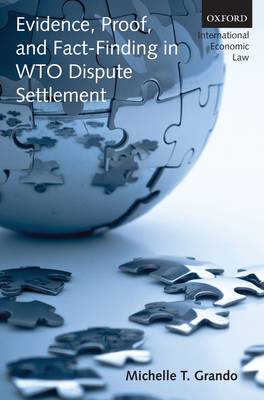
- Afhalen na 1 uur in een winkel met voorraad
- Gratis thuislevering in België vanaf € 30
- Ruim aanbod met 7 miljoen producten
- Afhalen na 1 uur in een winkel met voorraad
- Gratis thuislevering in België vanaf € 30
- Ruim aanbod met 7 miljoen producten
Zoeken
Omschrijving
This book examines the process through which a World Trade Organization (WTO) dispute settlement panel formulates its conclusions with respect to the facts of a case, i.e. the process of fact-finding or process of proof. The Dispute Settlement Understanding provides general guidance but few direct answers to specific questions regarding the process of fact-finding, which has placed upon panels and the Appellate Body the responsibility to provide answers to those questions as they have arisen in the cases. This book reviews the extensive jurisprudence developed in the 14 years of operation of the WTO dispute settlement system with a view to (a) determining whether panels and the Appellate Body have set out optimal rules to govern the process of fact-finding and, to the extent that that is not the case, (b) to make suggestions for improvement. This book analyzes questions such as (i) which party bears the responsibility of ultimately convincing the panel of the truth of a fact (burden of proof); (ii) what quantum of proof is necessary to convince the panel (standard of proof); (iii) the role of the panel, disputing parties, and non-disputing parties (e.g. experts, international organizations, private parties) in the development of the evidentiary record on which the panel bases its decision; (iv) the consequences of a party's failure to cooperate in the process of fact-finding; (v) how the parties can access the information which is necessary to prove their allegations; and (vi) the treatment of confidential business and governmental information. In assessing and making suggestions to improve the answers provided by panels to these questions, the book draws on the approaches followed in the two major legal systems of the world, the common law and the civil law, and to the extent possible the approaches adopted by other
international courts and tribunals.
international courts and tribunals.
Specificaties
Betrokkenen
- Auteur(s):
- Uitgeverij:
Inhoud
- Aantal bladzijden:
- 350
- Taal:
- Engels
- Reeks:
Eigenschappen
- Productcode (EAN):
- 9780199572649
- Verschijningsdatum:
- 5/03/2010
- Uitvoering:
- Hardcover
- Formaat:
- Genaaid
- Afmetingen:
- 236 mm x 160 mm
- Gewicht:
- 816 g

Alleen bij Standaard Boekhandel
+ 336 punten op je klantenkaart van Standaard Boekhandel
Beoordelingen
We publiceren alleen reviews die voldoen aan de voorwaarden voor reviews. Bekijk onze voorwaarden voor reviews.











